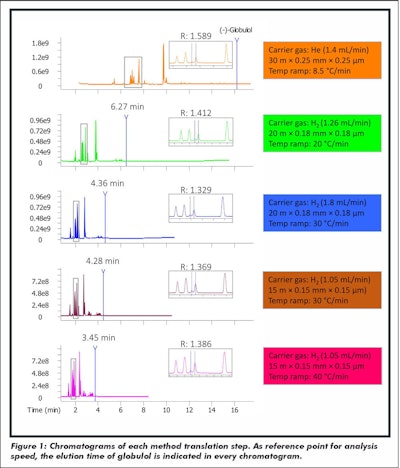
The quality of essential oils, such as tea tree oil, can be impacted by various processing or storage conditions, and it can degrade or change over time. Fast and reliable analytical screening is therefore critical for quality control of these products. A typical analysis of tea tree oil using a Pegasus BT and helium carrier gas can take around 16 minutes, with fantastic chromatographic resolution. By switching the carrier gas and optimizing the method for hydrogen using an online method translator, that time dropped to 3.45 minutes.
While the advantages of helium as a carrier gas for mass spectrometers have long been known, it is a limited natural resource. On the other hand, hydrogen gas generators can be installed in any lab for a constant supply and, conveniently, increased chromatographic speeds.
Not every instrument is capable of benefiting from using hydrogen as a carrier gas. The reduced viscosity of hydrogen can cause issues with the vacuum pump, and the higher speeds can confuse a detector that can't collect data fast enough to deconvolute and quantify the narrower peaks. However, LECO's Pegasus BT was designed to be able to use hydrogen instead of helium as a carrier gas.

With transferring to hydrogen, it was possible to dramatically increase throughput without significantly impacting resolution. Mass spectral fragmentation was highly similar to that obtained with helium, while the overall sensitivity actually increased by about 40%.
To learn more about this comparison of helium and hydrogen methods for tea tree oil analysis, submit the form accompanying this article to gain access to the full note.
Disclaimer:
The above paid-for content was produced by and posted on behalf of the Sponsor. Content provided is generated solely by the Sponsor or its affiliates, and it is the Sponsor’s responsibility for the accuracy, completeness and validity of all information included. Perfumer & Flavorist takes steps to ensure that you will not confuse sponsored content with content produced by Perfumer & Flavorist and governed by its editorial policy.










